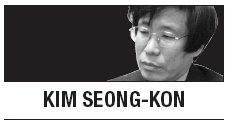Recently, the term “zombie” has become fashionable all over the world. For example, there are a plethora of American zombie movies such as “Land of the Dead,” “Diary of the Dead” and “Survival of the Dead,” and British ones such as “Shawn of the Dead,” “28 Days Later” and “28 Weeks Later.” American TV shows such as “The Crazies” and “The Walking Dead” have also been watched by millions of viewers around the world.
The same phenomenon can be found in academia as well. Several American universities have recently implemented courses on apocalyptic literature using the zombie motif. For example, Central Michigan University is now offering a

course entitled “From Revelation to the Waking Dead.” This summer, Michigan State University will offer the course “Surviving the Coming Zombie Apocalypse: Catastrophes & Human Behavior.” The University of California, Irvine, too, has just begun a free online course on zombies based on the TV series “The Walking Dead.” The University of Glasgow in the U.K. operates the website “Zombie Science: Zombie Institute for Theoretical Studies.” Perhaps we may soon find an official course called “Zombie Studies 101” at major American and British universities. They have already coined the term “zombiology.”
When Richard Matheson invented half-vampire, half-zombie creatures in his novel “I Am Legend” (1954), he presented the Undead as a signifier of “the others,” those who are different from us. Thus Matheson’s novel can be read as a splendid portrait of the American ’50s, plagued by McCarthyism and conservatism. Indeed, “I Am Legend” mesmerizingly renders the frustration of conservatives who believe they are morally right but are hopelessly outnumbered and overpowered by the ideologically deformed, contagious progressives. That is why the protagonist Robert Neville, realizing that his species is on the verge of extinction, silently cries, “I am legend!” at the end of the novel.
In his monumental film, “Night of the Living Dead,” George Romero uses the zombie motif to delineate and criticize the American ’60s. Indeed, “Night of the Living Dead” can be read as a powerful indictment of the clash between the two conflicting ideologies of the ’60s: left and right, progressive and conservative, symbolized by the war between zombies and zombie hunters in the movie. It is also a warning against the abuse of technology and the failure of communication in a closed society. The film also scrutinizes the arbitrariness of the boundary between the normal and the abnormal, or between civilization and madness, like the late French thinker Michel Foucault. It also touches upon the theme, “Who are crueler and less humane, the zombies or humans?”
Since the AMC TV show “The Walking Dead” began enchanting viewers, the image of zombies has changed. As the drama unfolds, it increasingly focuses on how to eliminate the menacing, deadly zombies and survive the impending apocalypse. Watching the TV series, people became interested in survival techniques in this apocalyptic age when the whole world is terrorized by fanatic terrorists, self-righteous ideologists and dangerous pandemics such as AIDS, avian flu and mad cow disease. In the States, some weekend camps are now offering zombie survival courses under the slogan, “Survive the Apocalypse.” In these camps, you can experience simulation battles with fake zombies, while acquiring basic survival skills in dangerous situations and hazardous circumstances.
Recently, I came across “Apocalypse Z,” an intriguing Spanish novel by Manel Loureiro. The novel, which is written in the style of a diary, is an account of a man who miraculously survives in a zombie-infested Spanish town. The novel is full of survival techniques for an apocalyptic age when people are surrounded by countless, carnivorous zombies. In this novel, zombies are presented as omnipresent, repulsive creatures to be exterminated.
I also read another captivating novel, “World War Z: An Oral History of the Zombie War” by Max Brooks. In the novel, the whole world has been pervaded by zombies. The novel depicts how each country deals with the apocalyptic situation, while exposing negative idiosyncrasies of each nation: South Africa’s apartheid; China’s black market organ trade; North Korea’s insulated society and numerous underground tunnels; and America’s overconfidence. Meanwhile, Israel closes its borders, abandoning the Palestinian territories, and Iran starts a nuclear war with Pakistan to stop the flow of refugees. The novel also criticizes government incompetence and corporate corruption. But the scariest thing is that the zombies are ubiquitous.
According to Brooks, zombies are scary because they are mindless and irrational. In an interview Brooks said, “The lack of rational thought has always scared me when it came to zombies, the idea that there is no middle ground, no room for negotiation. That has always terrified me.” Then he continued, “Any kind of mindless extremism scares me, and we’re living in some pretty extreme times.” Sadly, we find zombie-like extremists everywhere in our society, who neither take a middle ground nor have room for negotiation. These extremists, like zombies, will demolish our society and eventually cause the annihilation of human civilization. That is why zombies and zombie-like people are so scary.
By Kim Seong-kon
Kim Seong-kon is a professor of English at Seoul National University and president of the Literature Translation Institute of Korea. ― Ed.






![[Exclusive] Hyundai Mobis eyes closer ties with BYD](http://res.heraldm.com/phpwas/restmb_idxmake.php?idx=644&simg=/content/image/2024/11/25/20241125050044_0.jpg)
![[Herald Review] 'Gangnam B-Side' combines social realism with masterful suspense, performance](http://res.heraldm.com/phpwas/restmb_idxmake.php?idx=644&simg=/content/image/2024/11/25/20241125050072_0.jpg)
